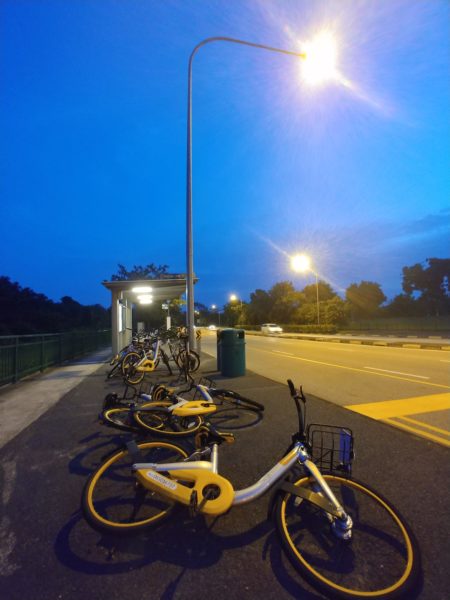
You’ve seen the shared bikes on foot paths, clogging up busy areas and causing an eye sore everywhere in Singapore.
Like many cities, it is feeling the effects of a fast expansion of such bike sharing services coupled with the selfish behaviour of users abusing the system.
No surprises then, that the authorities are now seeking tougher rules to force bike operators to retrieve their bikes more promptly and to penalise riders who park their bikes indiscriminately.
The Land Transport Authority will ask for feedback for its proposed rules later this month, as part of its effort to curb illegal bike parking, according to The Straits Times.
It’s true we can’t have nice things. When online platforms such as Uber first arrived a short few years ago, the sharing economy was touted as the future. You don’t need to own things, you can just rent them. Sorry, share them.
Unfortunately, as the bike sharing services here and elsewhere have shown, people often stop caring when they don’t own the thing they are using. Why bother with a bike I paid so little to use for a short while? I’ll just dump it right here, next to the drain.
The behaviour isn’t new. Selfish people routinely push supermarket carts all the way home and then leave them in the void deck, depriving others of a chance to use them.
One big difference with bike sharing is the scale of the online platforms we are talking about. Singapore’s oBike now has 14,000 bikes on the island.
China’s Mobike aims to deploy 10,000 of its own in an undisclosed time frame. That’s not counting Ofo, also from China, which has plans for 15,000 bikes in Singapore and Malaysia.
Just a small portion of inconsiderate users parking their bikes indiscriminately is enough to turn a nicely built park into an ugly sight. The majority who park their bikes properly will be tarred by the same brush.
Another important point is the motive behind such platform companies. Fuelled by venture capital, they seek to scale up to a point where they can block any rival from coming to the market. It’s only when they become a monopoly that the real money is made.
As these rivals duke it out, they have to push out as many bikes as possible, adding as many users as they can, to reach key milestones for investors and grow their “network effects”. They aim to be indispensable, like taxi hailing apps are today.
Meanwhile, the battleground is strewn with abandoned bikes. Even if you don’t use their bike services, you have to suffer the consequences of these firms backed by big money.
Have a look at China, where such bike sharing services have grown too fast. The bubble has now burst, with the third-largest player going bankrupt, amid intense competition. The authorities are still clearing the sidewalks of abandoned bikes, remnants of this new sharing economy.
In Singapore, the authorities are caught in a difficult position. If they come up with tough rules that make it too difficult to do business here, bike operators may leave.
Riders who depend on the bikes to get to the train station each day won’t be able to enjoy a cheap mode of transport. Remember the goal of a car-light society?
Yet, the authorities know they have to do something. Just like with taxi hailing firms, bike sharing companies have to be regulated more stringently for the simple fact that their services disrupt the lives of ordinary folk.
Could geo-fencing, as mentioned by Senior Minister of State for Transport Lam Pin Min in Parliament today, be an answer? Would an accurate system pinpoint the location that a user has dumped his bike, so he can be penalised later? Sadly, that may be needed.
The idea of bike sharing, as with many similar services like cab sharing, is that users can optimise the usage of limited resources in an urban area. That, as we know now, comes with strings attached.
Whether this is down to selfish human motivations or the money involved in an all-or-nothing bet, it’s clear that modern problems cannot be left to the sharing economy.






Can a software be written to not allow a bike to log off from the user who fail to park in the designated parking park & the charges to continue till it is in right and allowed place?.
Yes, I think that’s do-able, though the accuracy has to be better than now. For example, GPS alone will find it hard to determine if a user has dumped a bike at a void deck or if it is next to a designated parking bay. This could mean installing sensors and the like at these bays, which will drive up cost.